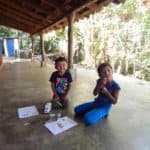They descended upon the Ipsan Nah Hotel (perhaps the title is taken from “Itzam Na,” the supreme deity in the Mayan pantheon, but I’m not certain of this), about twenty young professionals, twenty and thirty somethings: pre-med students, med students, pharmacy students, pharmacists, doctors, and other professional staff from MAHEC (Mountain Area Health Education Center) in Asheville, North Carolina. They squeezed into the all too small lobby of the hotel for their first night orientation before traveling south to the Frontera and the small town of Camasca in the morning. I’m always a little bit awestruck by the surreal incongruity of these groups thrust into a Honduran environment. There is a striking otherness to them reflected in their height, their physical presence, their clothing, their gait, and a million other identifiers before even considering the foreignness of their articulate English. This is even more highlighted as they are packed into this small space, listening to us expound upon the necessarily cautious and considered manner of engagement. I watch as patrons of the hotel enter the lobby. They freeze at the door, a deer-in-the-headlights look washes over their faces, as they consciously deliberate how to navigate through the horde of foreigners. One has to wonder why they are here, how will they be received, and what will they do? From this very limited perspective, this snapshot view, the only conclusion is that they are terribly lost, took a bad turn somewhere. A further conclusion might also be that they are, or will be, afraid, when confronted with how distant and different they are. A paralysis will set in and they will be completely overwhelmed and ineffective. But there is something else, something the snapshot view can’t capture, something the rash conclusion doesn’t consider. Their expressions betray an enthusiasm, even an elation, that they are readied for an unparalleled experience. Ostensibly, they have come here to serve, and certainly that service is needed and appreciated. But there is something else they bring, and something else still that they will find, that is as precious as it is indefinable. I leave them that night in the hotel wondering what will come of their time in Camasca.
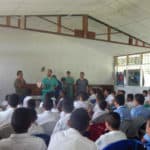
Because other demands draw us, Laura and I will not meet up with them for another week when their time is drawing to an end. On Wednesday, we do go to Camasca for an event at the bilingual school. We are hoping to see them, planning on it, but even as we head up the bumpy road to the town, a sub group of them herded into the bed of a pickup truck are headed in the opposite direction. I actually wave at them, but they are oblivious to our presence as our windshield is tinted and they can’t see us. They are laughing, bouncing up and down in the pickup, on their way to some remote village and its clinic to offer medical care. Later we head over to the main clinic where we think the other half of their group will be seeing patients. But we are foiled again as this is the one day that two groups went out to separate, remote villages. We speak with some of the clinic personnel. “How is the brigade doing?” “Oh, they’re wonderful. We love them. They’re so energetic, and they’re working so hard.” We spend the whole day in Camasca, but don’t see any of them. They’re off doing the medical thing. I guess they’re doing okay, but I feel slighted for having missed them.
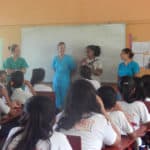
Laura and I check their schedule. On Monday (they’re leaving on Wednesday), they’ll be at the high school and a few of them will visit the bilingual school. We decide to meet up with them. At the high school, they’ve divided themselves into two groups. Male presenters meeting with the adolescent boys, and female presenters see the girls. They’re discussing all those delicate, teenage issues: sexuality, sexual health, mental health, well-being, etc. It goes as anyone might expect, as it would in any high school throughout the world. The kids sit with their arms folded, desperately trying to look bored and uninterested, but secretly clinging to every word, and praying to a gentle God that they will not be called upon to answer a question or give comment. I’m with the boys and the men, of course. They’re passing a basketball out to the students. When they catch it, they’re supposed to answer the questions. They like the basketball, but do their best not to catch it. There is nervous giggling and laughter, but I’m looking at the expressions on the brigade participants. They are animated, beaming even. They are glad to be here. Their clothes, their manner, their presence are all the same as they were on that first night in the hotel. They are seemingly just as foreign, just as out of place, as they were then. But no, that is not correct. In this short week, something has happened. They have given something and they have received something, and because of this exchange, something is new. It is a something that defies both definition and explanation.
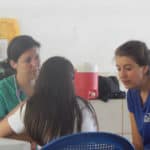
After the gender-specific group sessions, many of the students had opportunity for individual, brief medical consultations with brigade members. The brigade members rotated in and out of lunch and Laura had some one-on-one time with them. There was a deep spirit of satisfaction among them that was invigorating. Laura and I escorted the two pharmacists to the bilingual school. They had a toothbrush for each student. On the way we stopped at a corner store to buy a bag of candy. Toothbrushes and candy, the seemingly contradictory gifts were nonetheless well received. Everyone is very happy. I ask myself what it is that they have gained, what is it that they have given. What will come of this? I really don’t have an answer. It is, however, something of incomparable value.
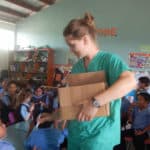
So Close, Yet So Far Away
Brown University built and operates the clinic at Guachipilincito, the small community about an hour’s walk or an hour’s drive from Concepcion. That sounds strange to say to those of us that are accustomed to cars driving along well paved roads, or distances that can be measured by a straight line extended from point A to point B. These assumptions don’t apply to Guachi, a place very close and yet so far away.
Brown has been coming down for many years. They are physically present in a brigade two times a year, but their presence there is more constant then that. There are various programs and supports that they have invested in for the people of Guachi that connect them to the wider world. But it’s very hard to maintain. Maybe it’s like building a sand castle along the shore during low tide. That’s not to say it’s a fool’s errand, but just that as close as one gets to Guachi, it seems to stay far away. But Brown has built buildings and relationships, is committed to ongoing service, makes the journey regularly, and something, though elusively hard to define, remains.
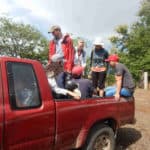
I was looking forward to meeting the nine person brigade, Brown University now partnered with Wingate University, School of Pharmacy. Wayne Hale, a man of great talent and knowledge, is always asking penetrating questions because he readily recognizes the inadequacy of his talent and knowledge. I was looking forward to the stimulating conversation, the discernment of strategy and service, but the necessary response to unanticipated challenges kept Brown/Wingate, Wayne, and Guachi distant. Two of their brigade members, one a medical student and the other a resident, found themselves even further away from Guachi as they did not make it onto the planes flying from the US to Honduras. I went to Tegucigalpa on the next day to escort them into the Frontera; six hours in for me and eight hours back for them. They got there a day late, but that is not so surprising when you think of the almost insurmountable chasm of distance between Miami or Atlanta and Guachi. I never got to Guachi during their week here. Another brigade in Camasca, the presence of a board member and the need to translate, innovative and exciting improvements at our bilingual school, and a series of other demands made that distance to Guachi even further. Thank God there’s two of us, because Laura did get there.
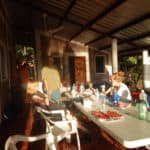
She went to Guachi with two Honduran, Shoulder to Shoulder doctors, one from our main clinic in Concepción and the other from the town clinic. She arranged for them to sit down and dialogue with Wayne, Judy Steinberg (the board president for the Guachi mission), and with other brigade members. They spoke about our Convenio system of care. They spoke about how to make referrals. They spoke about how to collaborate in mission. They spoke about the health and well-being needs of the people in Guachi. They spoke about how Brown/Wingate could help in ongoing care and how Shoulder to Shoulder’s presence and work in the Frontera could help bring effectiveness to the mission in Guachi. In a word, they spoke about how to bridge distances.
That is the main focus of our work here. It would be so easy if there weren’t so many mountains. It would be so easy if we had good roads. It would be so easy if Honduras weren’t so poor, or if the Honduran government would actually fund health care. It would be so easy if there weren’t so many cultural divides, or if we all spoke the same language. It would be so easy if Guachipilincito wasn’t that place that seems so close, but is really a world away. So, you build bridges. This is tremendously difficult work. It takes more than goodwill, talent, and knowledge. It takes an investment in humility and vulnerability, a patience that understands that the seemingly short distance is actually very far.
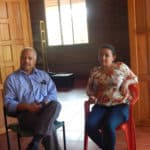
I didn’t get to Guachi. On the day that they were leaving, they hiked into Concepción. A truck would transport their luggage to their bus. The bus can’t get to Guachi because of the road. The bus would pick them up outside of our house in Concepción. I met them in the town square during market day: vegetable, fruits, venders, and pirated DVDs in every corner. They were all smiles, shaking my hand and introducing themselves. Their brigade was a great success. I was feeling some guilt that I had not gotten to them or to Guachi in the week that they were here. They, however, treated me as an old friend, and were excited to get to my house and see Laura again. At the house, they rehydrated after the arduous, hot, hour plus walk over mountain and dale. They had a few minutes to relax on our porch.
I spoke with Lynn, Wayne’s wife. I apologized for not getting to see them this week. We also talked about how sometimes it’s hard to know what’s best to do with limited resources and Guachi being so far away. She told me of a woman she met. The woman suffered with dwarfism and her feet were turned out perpendicular to her body. She walked with great difficulty. They had found some paper and traced the outline of her feet. With that they managed to buy shoes that fit her. She walks easier now. Lynn’s take on the whole thing (something she and her husband have been involved with all of their lives) was that you do what you can with what’s placed in front of you in the moment. What more can be expected? That was what she, and they, did for the woman she met. I thought about these great distances. This one woman was probably further away from the rest of the world than anyone in Guachi. Yet, she was found. She was met. She was honored. Maybe Guachipilincito is not as far away as it seems.
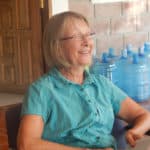
Thanks, Brown/Wingate Brigade, for making it to Guachipilincito.
Recording Hope
Jens sits at our dining room table, our only table, in La Esperanza, as Laura and I explain to him the particular water challenges we face here in Intibucá. Jens, a 17 year old, US born citizen of German heritage, living in Tegucigalpa, Honduras, is visiting with us over the next few days. His older brother Jan, Jan’s friend Aeden, and Mario, a friend of both families and the driver/chaperon for the trip, are all visiting us in our small and modest home. Aeden is home from college in Prague where he studies cinematography. Jan is interested in the same career, but studies at Emory University in Georgia. Shoulder to Shoulder has contracted with Aeden to produce three videos: two will be short ones on brigades and Shoulder to Shoulder in general, and the third will be a documentary on the bilingual school. Presently, we’re trying to arrange a fold out coach and three mattresses on our limited floor space so everyone can sleep. Jens continues to incredulously question us on the water, unwilling to conceive that water runs only every other day. “But, what do you do about that ‘take a shower every day’ rule?” We then introduce Jens to the concept of a bucket shower, a concept he’ll become familiar with over the next three days.
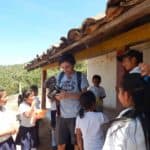
The rural, isolated, poor, frontier region of Intibucá is very unfamiliar to our four guests from Tegucigalpa. You might say that it presents as more foreign to them than it would have even to us when we first arrived. But they have all come with a spirit of openness, acceptance, and generosity. They capture on video the commitment to service in Pinares where Virginia Commonwealth University and Fairfax Family Practice Centers are holding their two week medical brigade. After a morning and afternoon of videotaping there, we drive south toward Concepcion where our guests will stay with us in our home there. It is clear that Mario doesn’t believe me when I tell him that three minutes after leaving Pinares we’ll run out of pavement. When we begin bumping up and down, navigating the trenches where rain has eroded the road, he asks how far to Concepcion. “Maybe ten miles, but it will take us about an hour.” Mario works with the Central American Bank. The Central American Bank subsidized the paving of this road. According to their records, it’s been paved all the way to Camasca. He will register an official complaint report. But our going is slow, not only because of the road, but also because every five minutes or so, Aeden and Jan yell to stop the car. They grab their equipment and jump out of the car. They take beautiful shots of the expansive terrain, the majestic mountains, and the awe it inspires. I take this road too often. I no longer recognize the breathtaking views or the bumpy drive.
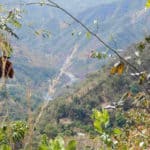
In Concepcion we all settle into our home. There is a lot more space and rooms, but we’re short a mattress. Mario disappears for a short time, and, unbeknownst to us, borrows a mattress from our neighbors. We tell the boys there is always water at night, but we often lose it for a few hours in the morning. They take no heed to our warning. In the morning, as they take their bucket showers, Laura and I are holding back our laughter as we watch them throwing cold water from our pila onto their bodies. So energetic and enthusiastic, so bright and ready to take on the world. With the medium of video, they will make art, their free expression to inspire.
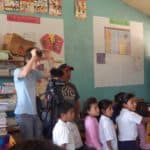
We head to Camasca and the bilingual school. Here, they are recording a view of hope. The parents send their children to our school with a great hope of something new, of achievement, of a better day. I can’t help think about those expansive, limitless views of the mountains from yesterday. Ironic, here where boundless beauty is so easily witnessed in nature, the constraints of poverty are so clear. Poverty limits experience, limits the horizon. Aeden films Juan Carlos and Keilyn, two cousins who live two-hundred meters below the town proper. They don’t have much, but they do have a climb up a great hill every morning. It’s a rugged climb and I feel some shame for my self pity that the road I travel is not paved. The path Juan Carlos and Keilyn take is one with carved footholds into a slate, rock face. They climb, we climb, we film, we record, and this is hope. It springs upon us when we reach the summit, an opening appears. Then we’re at the school.
Some of us have been given much, some of us, little. But all of us have rutted roads to travel, and all of us can gaze upon the expansive beauty of our world. Can not all of us then pattern hope? We can remember and record. We can share. It is not so important from where we start our journeys, but the integrity of the journey is the clear testament of hope.
